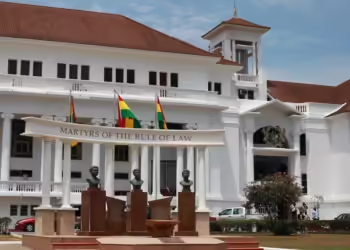Bassirou Diomaye Faye has been inaugurated as the nation’s new president, marking a remarkable journey from obscurity to the highest office in the land. Faye’s ascent, from a relatively unknown opposition figure to the presidency, has been swift and dramatic, culminating in his inauguration on Tuesday.
The road to Faye’s presidency was fraught with challenges. Less than two weeks before the March 24 election, he was released from prison alongside his mentor and popular opposition figure, Ousmane Sonko. This release came following a political amnesty announced by outgoing President Macky Sall, underlining the political upheaval leading up to the election. Faye’s election victory marks his first time holding elected office.
“It’s the culmination of a long struggle for democracy and the rule of law,” remarked Aissata Sagna, a factory worker who actively supported Faye’s campaign. Despite the celebratory mood, there is a somber acknowledgment of the lives lost during the preceding demonstrations.

The election itself was a test of Senegal’s reputation as a stable democracy in West Africa. Months of unrest preceded it, sparked by the arrests of Sonko and Faye the previous year, coupled with concerns over presidential term limits. Human rights groups reported casualties and arrests during the protests.
Faye campaigned on promises to tackle corruption and manage the country’s natural resources more effectively, resonating particularly with young people disillusioned by widespread unemployment and perceived exploitation by former colonial powers. His victory is seen as a reflection of this sentiment.
In his inaugural address, Faye reiterated his commitment to fighting corruption and revitalizing the economy. His declaration of assets ahead of the election aimed to demonstrate transparency, setting a precedent for political accountability.
The formation of Faye’s government is anticipated to be his first major task. Analysts emphasize the importance of diversity and reform in his administration, signaling a departure from the past.
Faye’s political rise gained momentum when Sonko, unable to contest the election due to prior convictions, named him as his successor. Sonko’s role in the new administration remains uncertain, although he is expected to play a significant part.
Both Faye and Sonko faced legal challenges orchestrated by the previous government, adding to the political turbulence preceding the election. President Sall’s decision to not seek a third term, followed by the postponed election in February, further underscored the volatility of Senegal’s political landscape.
As Senegal ushers in a new era under President Faye, the nation braces for the challenges and opportunities that lie ahead.


















